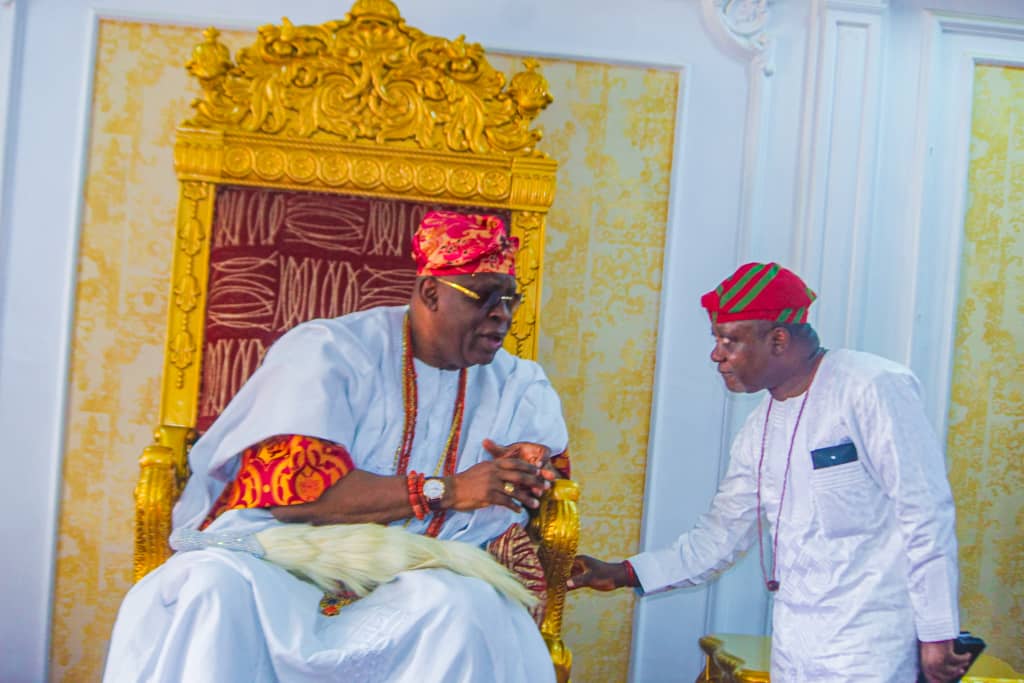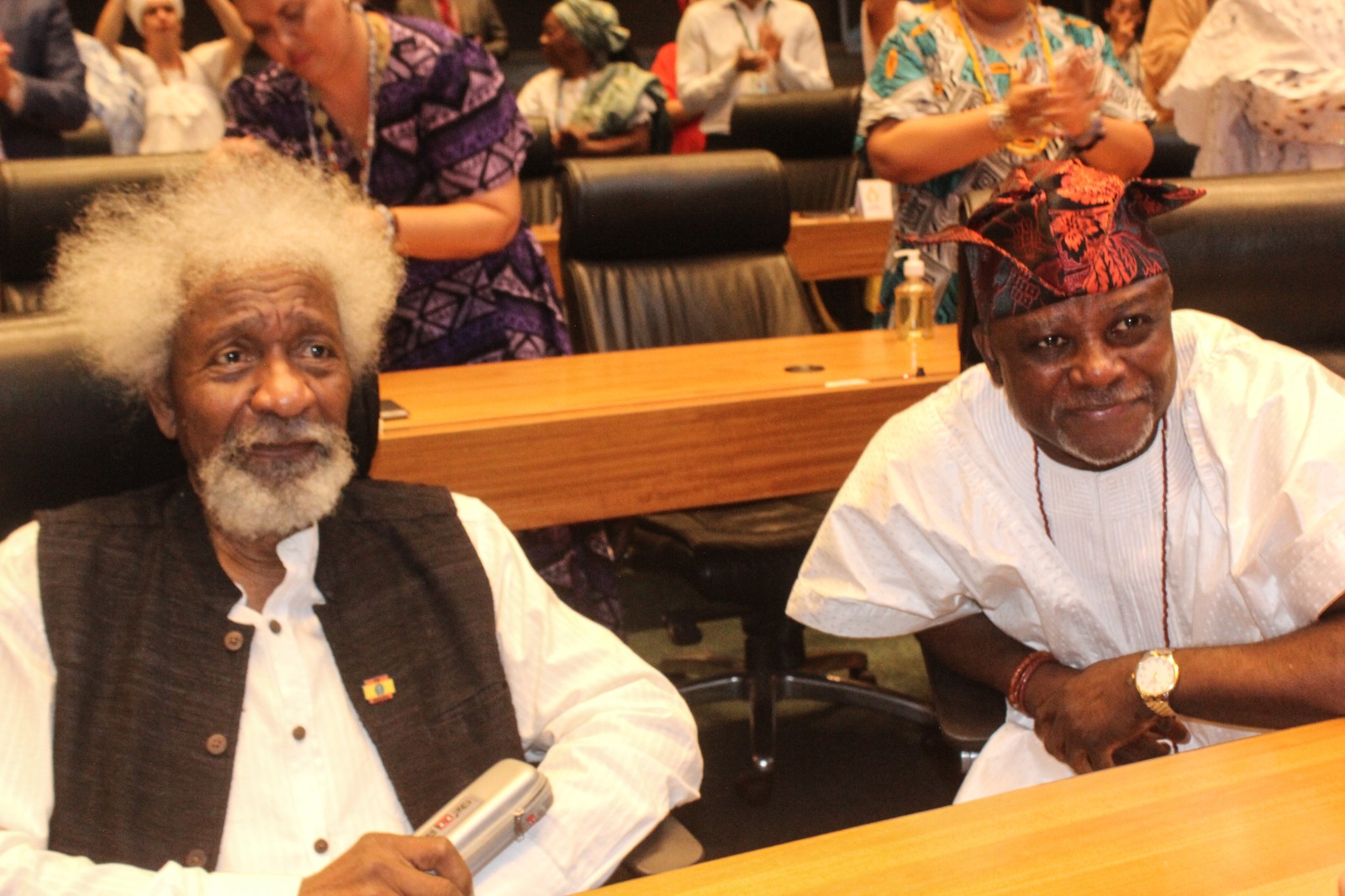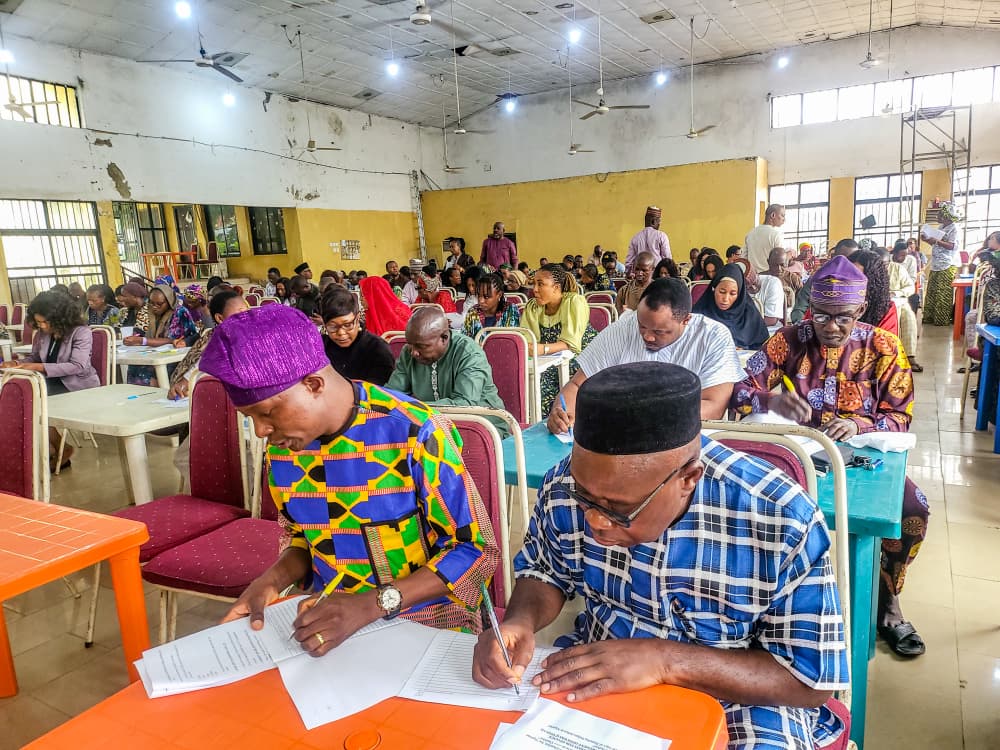The Play Reading of Barclays Ayakoroma’s Castles in the Air, organized by Arojah Royal Theatre, Abuja has elicited reactions that will help Nigeria in its quest for development, especially in the transformation Agenda.
Theatre practitioners, university scholars, politicians, cultural ambassadors, and stakeholders in the culture sector, who were present in the reading session, observed that the social, cultural, political, and economic relevance of the play makes it vital that its message should not stop at reading alone but acted on stage, radio and television for all Nigerians to imbibe.

The Director-General, National Institute for Hospitality and Tourism (NIHOTOUR), Alhaji Munzali Dantata, as the Special Guest of Honour, noted that the play has messages that will move Nigeria forward, suggesting that Castle in the Air should be taken to all communication media, Alhaji Dantata said: “I want to say that this play is vital to Nigeria. It has looked at several issues in Nigeria, ranging from ethnic problems, religious problems and sectarian crises. We can recall such problems as Ife/Modakeke crisis, Jos crisis, Aguleri/Umuleri communal clash, Tiv/Jukun crisis, militancy, Boko Haram, fraud, corruption, family problems, etc. The play gave solutions as to how to sort these things out through the resolution in the play.”
 On his part, former National Publicity Secretary, Peoples Democratic Party (PDP), Hon. Emmanuel Ibeshi, noted that the play sends political messages, domestic problems, youthful exuberance, attitudinal problems, and value system in Nigeria.
On his part, former National Publicity Secretary, Peoples Democratic Party (PDP), Hon. Emmanuel Ibeshi, noted that the play sends political messages, domestic problems, youthful exuberance, attitudinal problems, and value system in Nigeria.
He said: “This play is very political. We are witnesses to the problem Nigeria had in January over the fuel subsidy removal. One problem is that of thuggery in politics, where the politicians give the youth small money, say N5,000.00, and they will perpetrate evil. The problem is that such youths will soon grow to become the leaders of tomorrow. The question is what kind of leadership would they give to the people? This is the problem in our value system. When you have children abroad, who are in school, you are afraid that when they come they will exhibit the kind of exuberance the playwright has prophetically put up in the character of Stella. And by presenting that character to us, the playwright is exposing such behaviour. The youths, when they are sent to school, leave their studies and face other things, yet we blame the elders. The youths should learn to ask themselves: what can I contribute to the growth of the Nigerian economy?’’
 This question is where lies the social, economic and cultural relevance of Castle in the Air because President Goodluck Jonathan’s Transformation Agenda is a programme meant to turn around the Nigerian economy for the best by 2015.
This question is where lies the social, economic and cultural relevance of Castle in the Air because President Goodluck Jonathan’s Transformation Agenda is a programme meant to turn around the Nigerian economy for the best by 2015.
Chukwuemeka Okereafor, founder, International Association of Public Affairs Analysts, noted that the playwright, like a prophet, had observed all these in the play, while Seun Odukoya, suggested that the issue of corruption and mismanagement of public funds should be fought vehemently: “We have agencies like the EFCC and ICPC. Government should intensify the efforts on the fight against the mismanagement of money and corruption. It is a big problem and if we fight it, we can transform the country,” Odukoya said.
T he reading also offered an opportunity for the playwright, Dr. Barclays Ayakoroma, the Executive Secretary of National Institute for Cultural Orientation (NICO), to respond and comment about the play, state of arts in Nigeria, as well as the state of the nation.
he reading also offered an opportunity for the playwright, Dr. Barclays Ayakoroma, the Executive Secretary of National Institute for Cultural Orientation (NICO), to respond and comment about the play, state of arts in Nigeria, as well as the state of the nation.
According to him: “It was for want of a play of manageable cast that I wrote this play in 2001, when I was the 5irector of Council for Arts and Culture, Bayelsa State. The inter-tribal marriage in Nigeria struck my mind. There are many issues being raised in the play as they relate to Nigeria that did not cross my mind when I was writing the play. The issue of prophecy from a playwright is really that what he puts down may be interpreted in many ways. That is why it is always said that a playwright is the person that least understands his play. My message in the play is really for us to accept the way we are. At the national level, I am saying that there is a time we will be forced to go back to our individual resources in our various states, and use them to boost the national economy. Again, our value system is dying. Munzali can bear me witness that there was a time in Nigeria; if you came into questionable fortune, your father would query the source of such wealth. But it is no longer the case today. These issues are spelt out in the play. When acted on stage, all these can be appreciated. I really wish to see what I saw in the Film and Broadcast Academy (FABA), Ozoro, Delta State. They really got the characterizations I had in mind.’’
T he Director of Arojah Royal Theatre, Jerry Adesewo, who announced that the play alongside other plays by Ayakoroma will be featured on 27th March, 2012, to mark the International Theatre Day (ITD), promised that the calibre of actors and actresses Aroja was assembling for the production would interpret the play very well: “This Play Reading Party is in preparation for the staging of Castles in the Air and other plays of Ayakoroma in a Festival of Plays of Barclays Ayakoroma to mark the ITD coming up on 27th March, 2012. The cast we are presenting to you will really bring the message of the play out. Patrick Otoro is playing the role of Chief Emotari. He will really interpret it well to suit the typical Izon character portrayed by the playwright. We solicit for support to carry out our projects so that live theatre will be kept alive.’’
he Director of Arojah Royal Theatre, Jerry Adesewo, who announced that the play alongside other plays by Ayakoroma will be featured on 27th March, 2012, to mark the International Theatre Day (ITD), promised that the calibre of actors and actresses Aroja was assembling for the production would interpret the play very well: “This Play Reading Party is in preparation for the staging of Castles in the Air and other plays of Ayakoroma in a Festival of Plays of Barclays Ayakoroma to mark the ITD coming up on 27th March, 2012. The cast we are presenting to you will really bring the message of the play out. Patrick Otoro is playing the role of Chief Emotari. He will really interpret it well to suit the typical Izon character portrayed by the playwright. We solicit for support to carry out our projects so that live theatre will be kept alive.’’
 The genre of the play, being a satirical comedy, harps on the traditional prejudices about inter-tribal marriages between various ethnic groups in Nigeria, through characters who build their own castles in the air.
The genre of the play, being a satirical comedy, harps on the traditional prejudices about inter-tribal marriages between various ethnic groups in Nigeria, through characters who build their own castles in the air.
The PRP took place on Thursday, 23rd February, 2012 at Korean Cultural Centre, 2nd Floor, Rivers State House, opposite Ministry of Finance, Central Business District, Abuja with the Director-General, National Institute for Hospitality and Tourism (NIHOTOUR), Alhaji Munzali Dantata, as the Special Guest of Honour. 
Also Peoples Democratic Party (PDP) chieftain, Hon. Emmanuel Ibeshi, founder International Association of Public Affairs Analysts, Chukwuemeka Okerafor, renowned actors like Albert Odulate, and Partick Otoro were at the event.
Others include Ahmed Sule, Mr. Sam Agbi, representing of D-G, NCAC, M.M. Maidugu, Dotun Osunsanya of NCAC, stakeholders in the culture sector, University Teachers, students of theatre arts in Nigerian Universities, playwrights, actors, directors, stage designers, lighting designers, critics and arts journalists in Nigeria.
Nwagbo Nnenyelike
Corporate Affairs


